Five Reasons to Visit Spoke Wine Bar
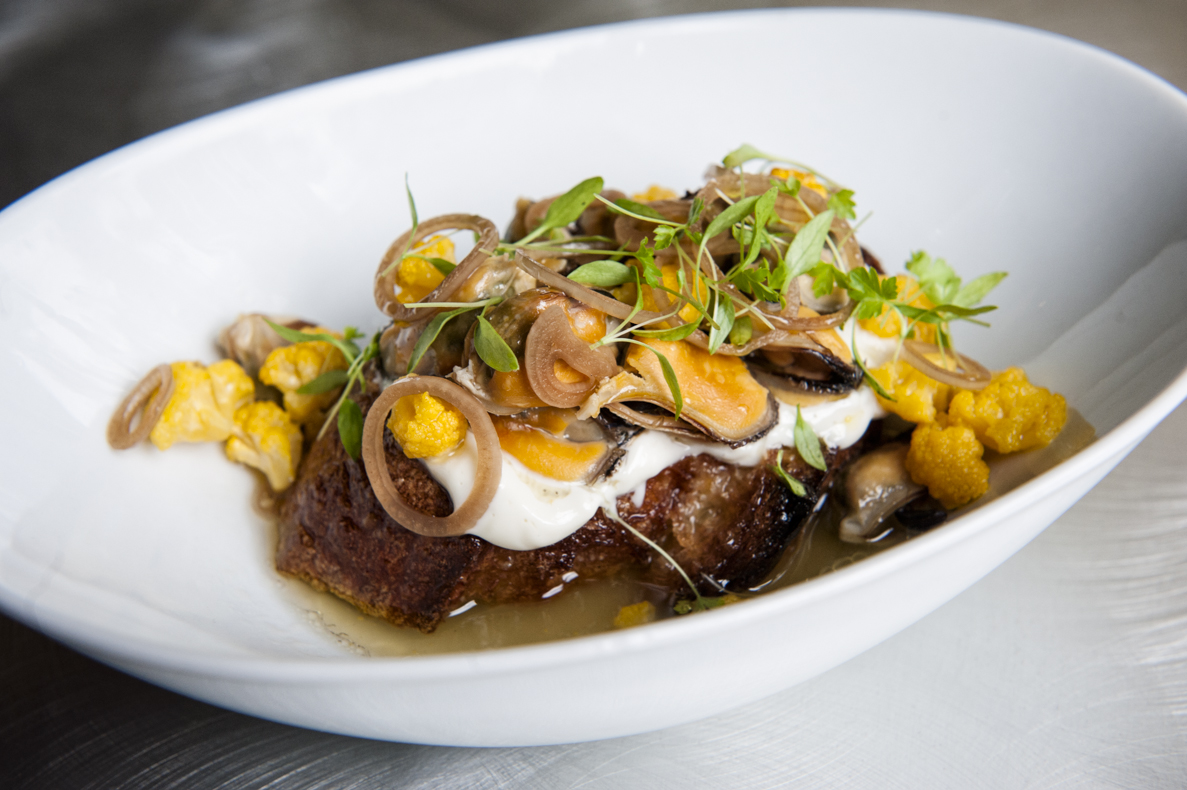
Smoked mussels escabeche. Photo by Chelsea Kyle
Prior to her love affair with wine, Spoke owner Felisha Foster was a women’s college basketball coach at The University of South Alabama, where her squad was regularly on the wrong side of a double-digit drubbing. “I’ll never forget that moment of sitting on the bench and feeling completely helpless. You just want the clock to start ticking faster, so the other team can’t keep running up the score.” Foster says. After growing weary of her bleak situation, Foster found herself looking for a new career, which is how she found herself running one of Mobile, Alabama’s only fine wine and cocktail lounges, Double Olive.
Eventually, Foster moved on toward the Eastern Seaboard, first to Baltimore, then Boston. She became the wine buyer for Dave’s Fresh Pasta in Somerville, turning a cramped sandwich and specialty shop into one of the most compelling retail outlets for family-owned, small-production wines in Boston. Finally, in 2010, Foster went on a “journey of self-actualization,” a 2,200-mile motorcycle sojourn through California, Oregon, and Washington, where she had an epiphany of sorts. She wanted to combine all that she was passionate about, not just wine, but also her love of food, craft cocktails, and boundary-pushing artisanal ingredients into one intimate dining experience.
She pitched the concept to Dave’s Fresh Pasta owner Dave Jick and assembled a staff from Barbara Lynch’s talent pool, first John daSilva, former executive sous chef at No. 9 Park, then Cali Gold, a bartender at Drink. When the dust settled a year later, not only had Foster erected one of Somerville’s most electrifying new restaurants, she had re-imagined the antiquated framework of the successful wine bar.
Whether you’re a teetotaler or an oenophile, here are five reasons why you should be frequenting Spoke.
1. The Wine
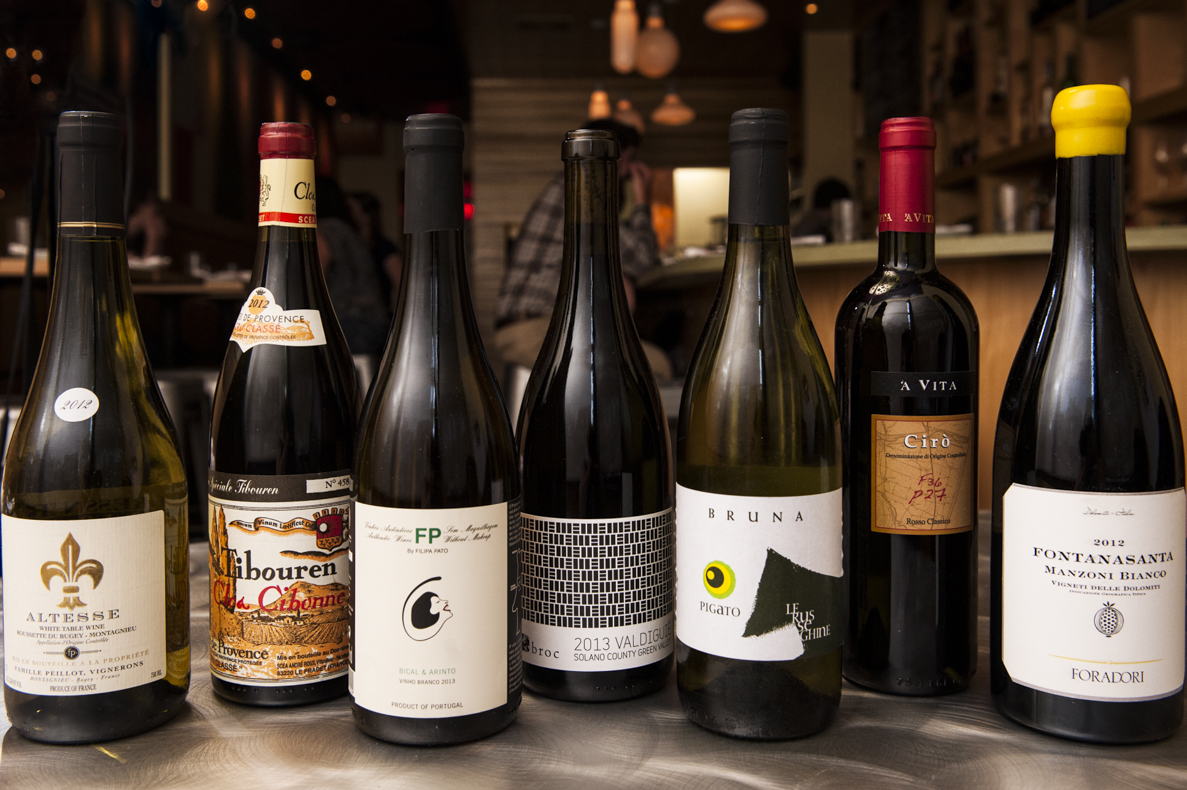
Photo by Chelsea Kyle
Put simply, Spoke is the place to embrace the atypical, and to get swept into an exotic new experience. Foster knows that you haven’t had a Ligurian pigato, a ruché from Piedmont, or a sparkling gruner veltliner, but that’s the point. Working with importers like Louis/Dressner, Kermit Lynch, and De Maison, Foster assembles every stylistic choice, though ensuring they come from “smaller, family-run estates who care about the land and the communities that surround them.” Most of Spoke’s menu (20 by the glass) lean toward cooler regions such as France’s Loire Valley, where the wines are bigger on acid and minerality, characteristics that work better with food. But lovers of lush, fruit-forward wines can find plenty of compatible bottles. “I have a pretty juicy barbera on the list right now that doesn’t necessarily go with any of John’s food, but sometimes people want to just come in and drink wine,” Foster says. “… Most of the time people just don’t know that they like these other varietals because they’ve never been exposed to them. I’ve got everything covered stylistically, while also fitting into the Old World philosophy that I love.”
2. Quail and Waffles
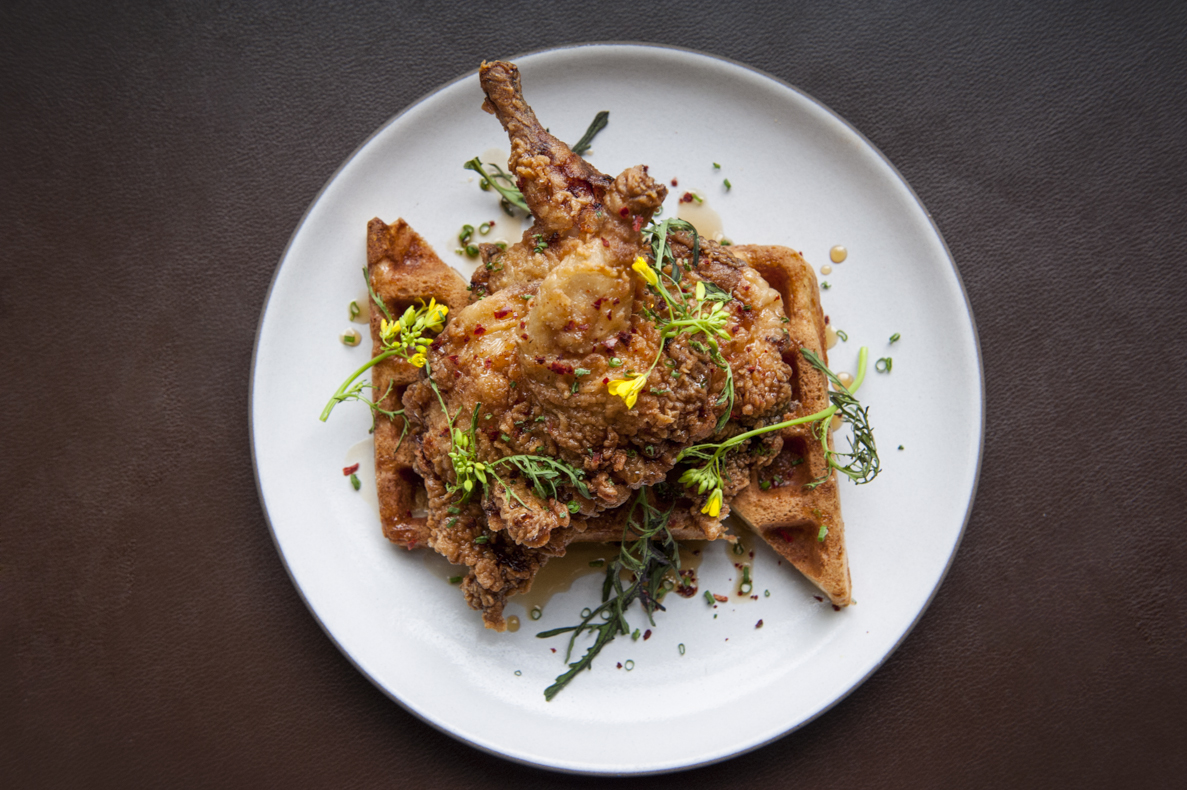
Quail and waffles at Spoke. Photo by Chelsea Kyle
Inspired by the foie gras and waffles he conceived early in his career at No. 9 Park, executive chef John daSilva made a new version, which has since turned into something of an industry hit. Now when Alden & Harlow’s Michael Scelfo or Ana Sortun and the crew at Sarma stop in on a night off, they’re almost assuredly ordering this all-Vermont assemblage made with chicken fried Cavendish quail, hickory smoked Cabot butter, a Grafton sharp cheddar waffle, and real maple syrup. “There’s a big focus on foie gras at No. 9, so in its previous iteration, this dish used to be a sensory overload,” daSilva says. “I know Jamie Bissonnette came in and raved about the foie gras and waffles when I was there. That one had more bravado and swag, but I actually think the quail works a lot better. Plus, foie gras is expensive, and we’re not on Beacon Hill over here. We wanted to highlight all Vermont products—it’s a Vermont riff on a Southern classic—and overall, I think we’ve perfected the dish.”
3. Wild Card Cocktails
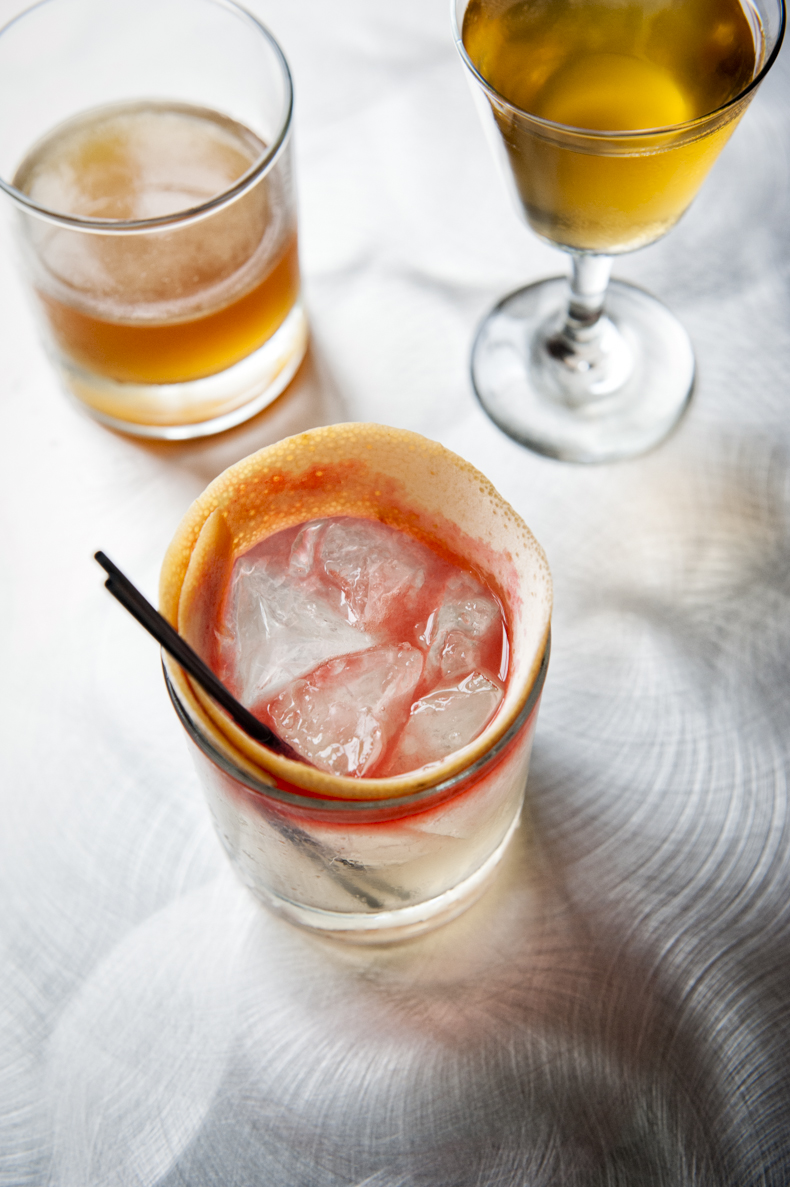
‘Wild Card’ cocktails. Photo by Chelsea Kyle
Spoke’s cocktail list is separated into three distinct categories: “Classic,” for purists comforted by a soundly constructed Manhattan or Moscow Mule; “Modern,” exploring contemporary trends in mixology like digestifs and sherry; and “Wild Card,” where bar manager Cali Gold can really flex her creative muscle. Take, for example, the French Diplomat, made with rye, green Chartreuse, the Italian aperitif Kina L’Avion, and a savory mirepoix syrup. That’s just one piquant creation, as her experimental Wild Card menu has included elixirs made with everything from cumin and barbecue bitters to Tabasco and pink peppercorns. Then there’s “Bespoke” on Thursday evenings, when Gold takes her fondness for the avant-garde even further. On a chalkboard is a seemingly random list of ingredients, all of which can be chosen toward an original cocktail. Like similar programs across the country seasonal fruits and herbs are in play, but so are more peculiar components such as Greek yogurt.
4. American Cured Ham Board

Cured ham board at Spoke. Photo by Chelsea Kyle
Even at better wine bars, the novelty of that single-vineyard Aglianico often wears off when the charcuterie board arrives. Unlike the monotonous hodgepodge cobbled together at other establishments, daSilva assembles Spoke’s charcuterie selection with deliberation. Iggy’s country baguette is paired with a house-made honey butter, while house-pickled cauliflower and cukes provide a streak of acid potent enough to cut through the fattiness of America’s most prized country hams. “Italy has prosciutto and Spain has Serrano, but I really feel like the U.S. is at a point now that—and has been for a while—that people are starting to take American ham seriously,” daSilva says. The rotating selection includes all-manner of salumi from Iowa-based La Quercia, hickory smoked heritage hog from Edwards in Virginia, a pepper-crusted speck from Olli Salumeria, and Allan Benton’s much-fetishized Smoky Mountain country ham.
5. Bar Snacks That Are Actually Good
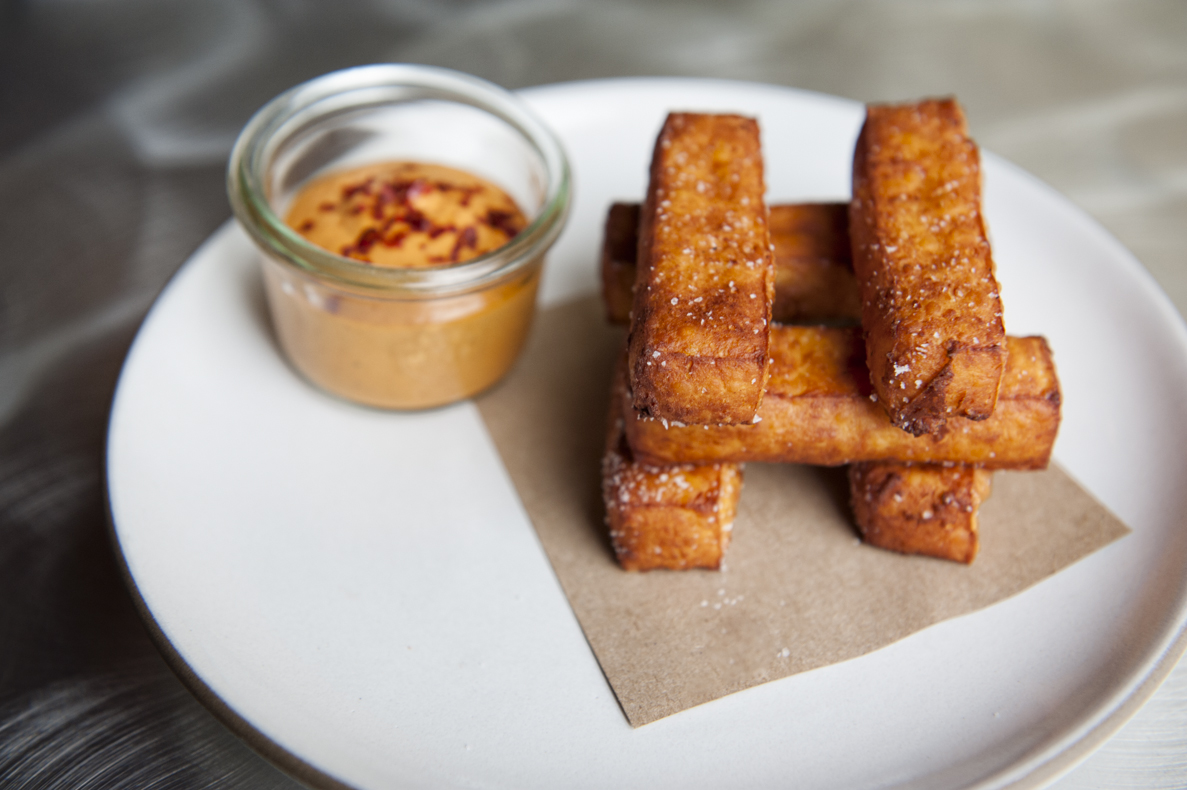
Chickpea Panisse Frites.
John daSilva, who describes his cuisine as “refined comfort food,” is a crack practitioner of the small plate. “The chickpea panisse has been on [the Spoke menu] for six months, but it’s something I’ve been doing for most of my career,” daSilva says. “I learned how to make in Nantucket with Erin Zircher, and now it’s something I don’t think we can take off because people are so enamored with it. There are people who have had this dish from when I was over at No. 9 Park and it was on the bar menu. They’ve followed their nose all the way over here.” Served with a spicy harissa aioli, it’s just one of many bar bites perfect alongside Foster’s selection of food-friendly wines. You’ll also find marinated olives, grilled pita with an assortment of dips (carrot-feta, red pepper-walnut, chickpea herb), and a smoked mussels escabeche poached in white wine. “We hot smoke the mussels over hickory then plate it with roasted cauliflower and fried bread slathered in a garlic and sherry aioli. That’s one key element to what we do at Spoke—the good sauces, the aged sherry vinegar, and the high-quality olive oils,” daSilva says.


